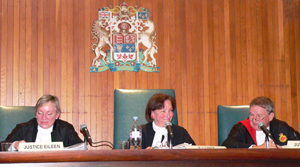As much as law school is about studying hard and getting a good job, students still have some fun.

Although it was a serious debate, there were jokes all around at the University of Toronto Faculty of Law’s Grand Moot on Oct. 6 — especially from Supreme Court of Canada Justice Rosalie Abella, who is known for her humour.
The theme of this year’s moot was “Meth labs, public safety, and the Charter.”
The annual event attracted some faculty members and hoards of students — to the point where there was standing room only for some.
Presiding over the case were justices Abella, Eileen Gillese of the Ontario Court of Appeal, and John McMahon of the Ontario Superior Court.
The mooters were law students Michael Portner Gartke and Emily Shepard for the Crown, and Joe Ensom and Kate Southwell for the defence.
The case involved John Appleseed, the defendant, who called 911 for medical assistance. He told the firefighter, Mark Johnston, who arrived on the scene that he suffered burns to the left side of his body from knocking over a pot of boiling pasta. However, the firefighter thought the burns were caused by acid and suspected Appleseed of running a meth lab. Johnston told fire chief Mark Greenberg about his suspicion. Greenberg asked Appleseed for permission to enter his home but he refused. Once paramedics took Appleseed away, Greenberg decided to enter his home — without a warrant — and discovered a meth lab in the basement.
The court was asked to decide whether the search of Appleseed’s home by the fire department contravened s. 8 of the Charter of Rights and Freedoms, and if so, should evidence from the search be excluded in accordance with s. 24(2) of the Charter.
As the two sides argued their points, the judges did not hold back their rebuttals, but the mooters held their composure.
Some of the issues argued in the moot court related to whether Greenberg acted in good faith, if the situation posed an imminent danger, and if Appleseed’s privacy rights were violated.
The judges did not release a ruling in the case as the exercise was meant to provide trial practice for the students.

 Although it was a serious debate, there were jokes all around at the University of Toronto Faculty of Law’s Grand Moot on Oct. 6 — especially from Supreme Court of Canada Justice Rosalie Abella, who is known for her humour.
Although it was a serious debate, there were jokes all around at the University of Toronto Faculty of Law’s Grand Moot on Oct. 6 — especially from Supreme Court of Canada Justice Rosalie Abella, who is known for her humour.